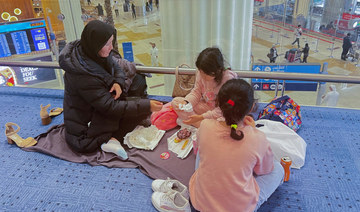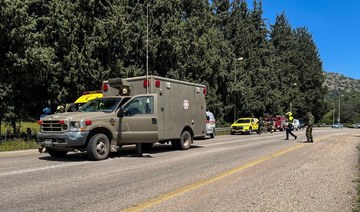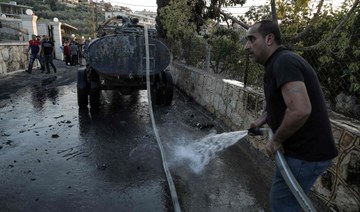BEIRUT: Lebanese banks said on Monday they would ensure public sector workers were paid their salaries as they remain closed by a wave of protests against politicians blamed for corruption and steering Lebanon towards economic collapse.
Protesters set up new roadblocks early on Monday to keep pressure up, defying security forces who tried to re-open roadways but with orders not to use force.
As the day wore on the protests, now in their 12th day, appeared to be smaller than in recent days.
The crisis has paralysed Lebanon, closing banks, schools and some businesses. The government has yet to indicate it would cede ground to protesters, whose demands include its resignation.
On Monday President Michel Aoun said on he was "following developments", and Prime Minister Saad al-Hariri is due to hold a cabinet meeting to discuss one of the measures in an emergency reform package proposed last week.
Lebanon's banking association said banks would remain shut on Tuesday for a 10th working day, but said the central bank had provided the liquidity necessary to pay out salaries for public sector workers, including security forces.
Banks have previously said they will ensure people receive their end-of-month salaries through ATMs. The banks have said they are staying closed out of concern for the safety of customers and employees.
Bankers and analysts have also cited wide fears depositors will try to take out their savings when banks reopen.
Gabriel Sterne, head of global macro research at Oxford Economics, said Lebanon is facing a "bank jog", rather than a full-blown bank run. He added that capital controls were needed in the short-term, but can also scare away investors.
The International Monetary Fund (IMF) said it was evaluating an emergency reform package the Lebanese government announced last week, but which has failed to defuse the popular anger or reassure foreign donors.
Capital inflows needed to finance the state deficit and pay for imports have been slowing down, generating financial pressures not seen in decades, including the emergence of a parallel market for dollars.
While Lebanon's pound currency is officially pegged at 1507.5 to the dollar, parallel market rates have risen in recent months.
One market source quoted a price of 1,700 pounds to the dollar, while a second quoted 1,740, a roughly 15% premium on the official rate.
As economic strains have grown in recent years, Lebanon's central bank and banks have taken measures to encourage people to keep money in local currency, in longer term deposits and inside the country.
While Lebanon has not imposed hard capital controls, a state prosecutor banned traders and money exchangers from taking significant amounts of physical dollar currency out the country at air and land borders, without specifying amounts.
Protesters gathered early on Monday to cut major arteries across Lebanon, using cars, tents and dumpsters.
"We know we are facing lying, corrupt ruling authorities. It's been 30 years of promises and promises. Why would I believe them now?" said Rawad Taha, 21, a university student manning a roadblock in Beirut.
"I won't leave the street until the government resigns or there's a tangible change I can feel."
On one major road in Beirut, protesters set up a make-shift living room with sofas, armchairs and a fridge for the sit-in.
The leaderless rallies have drawn people from around Lebanon furious at sectarian political leaders they see as plundering state resources for personal gain.
Lebanon is saddled with one of the world's highest levels of government debt as a share of economic output. The IMF has forecast a fiscal deficit of 9.8% of GDP this year and 11.5% next year.
Prime Minister Hariri's coalition government, which includes nearly all of Lebanon's main parties, tried to appease the protesters with a set of reforms including anti-corruption laws and long-delayed measures aimed at fixing state finances.
The plans includes accelerating long-delayed steps to fix the state-run power sector, which drains $2 billion from the treasury per year while failing to meet power needs for the Lebanese.
"We need to see not only what is in the package but also the timeline of the package for a country like Lebanon that has such high level of debt over GDP and high levels of twin deficits," Jihad Azour, director of the IMF's Middle East and Central Asia Department told Reuters.
"Fundamental reforms are urgently needed in Lebanon in order to restore macro-economic stability, bring confidence back, stimulate growth and provide some solutions to the issues that were raised by the street," Azour said.
Lebanon's closed banks pledge to pay out salaries
Lebanon's closed banks pledge to pay out salaries
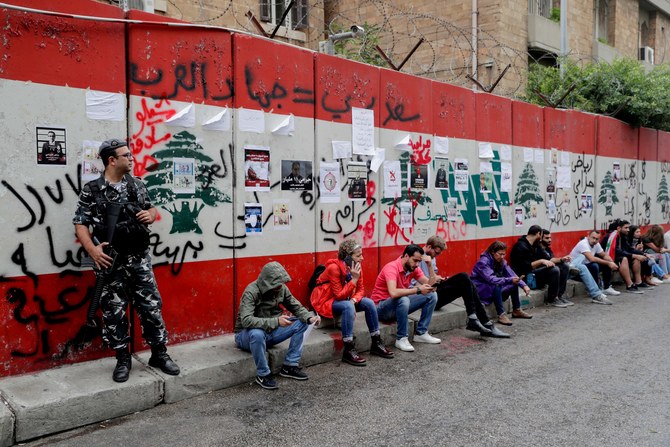
- Protesters block roads with barricades, tents, cars for 12th day
- Banks remained closed for ninth day
Hamas slams US veto of Palestinian UN membership bid

PALESTINIAN TERRITORIES: Palestinian militant group Hamas condemned on Friday the US veto that ended a long-shot Palestinian bid for full United Nations membership.
“Hamas condemns the American veto at the Security Council of the draft resolution granting Palestine full membership in the United Nations,” the Gaza Strip rulers said in a statement, which comes amid growing international concern over the toll inflicted by the war in the besieged Palestinian territory.
The veto by Israel’s main ally and military backer had been expected ahead of the vote, which took place more than six months into Israel’s offensive in Gaza, in retaliation for the deadly October 7 attack by Hamas militants.
Twelve countries voted in favor of the draft resolution, which was introduced by Algeria and “recommends to the General Assembly that the State of Palestine be admitted to membership of the United Nations.” Britain and Switzerland abstained.
Gazans search for remains after deadly Rafah strike

An Israeli strike hit the home where a displaced Palestinian family was sheltering in the southern city of Rafah, relatives and neighbors told AFP as they scraped at the soil with their hands.
Al-Arja said the blast killed at least 10 people.
“We retrieved the remains of children and women, finding arms and feet. They were all torn to pieces.
“This is horrifying. It’s not normal,” he said, hauling concrete and broken olive branches from the wreckage. “The entire world is complicit.”
Soon after the war began on Oct. 7, Israel told Palestinians living in the north of Gaza to move to “safe zones” in the territory’s south, like Rafah.
But Israeli Prime Minister Benjamin Netanyahu has since vowed to invade the city, where around 1.5 million people live in shelters, more than half the territory’s population.
“How is Rafah a safe place?” said Zeyad Ayyad, a relative of the victims. He sighed as he cradled a fragment of the remains.
“I heard the bombing last night and then went back to sleep. I did not think it hit my aunt’s house.”
The search for remains was long and painful. The strike left a huge crater and children picked through the rubble while neighbors removed debris, tarpaulin, a pink top.
“We can see them under the rubble and we’re unable to retrieve them,” Al-Arja said.
“These are people who came from the north because it was said the south is safe.”
“They struck without any warning,” he said.
In a separate strike on the house in Rafah’s Al-Salam neighborhood overnight on Tuesday, rescue crews recovered the corpses of eight family members, including five children and two women, Gaza’s civil defense service said.
“An Israeli rocket hit a house of displaced people,” said resident Sami Nyrab.
“My sister’s son-in-law, her daughter, and her children were having dinner when an Israeli missile demolished their house over their heads.”
Dubai clears up after epic rains swamp glitzy city
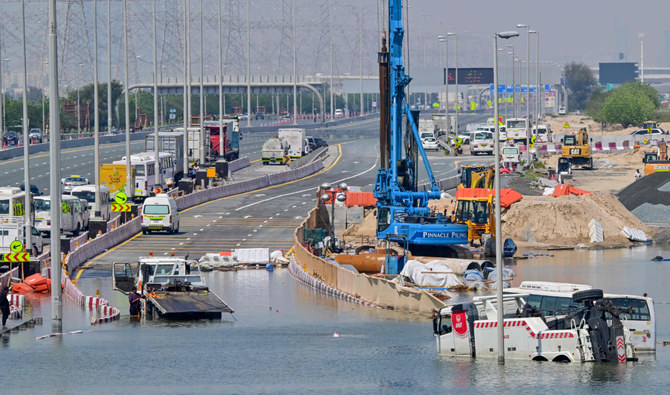
- The rains were the heaviest experienced by the UAE in the 75 years that records have been kept
DUBAI: Dubai was busy on Thursday clearing its waterlogged roads and drying out flooded homes two days after a record storm deposited a year’s worth of rainfall in a day.
Dubai International Airport, a major travel hub, struggled to clear a backlog of flights, and many roads were still flooded in the aftermath of Tuesday’s deluge.
The rains were the heaviest experienced by the UAE in the 75 years that records have been kept.
They brought much of the country to a standstill and caused significant damage.
Flooding trapped residents in traffic, offices, and homes.
Many reported leaks at their homes, while footage circulated on social media showed malls overrun with water pouring from roofs.
Traffic remained heavily disrupted.
A highway through Dubai was reduced to a single lane in one direction, while the main road connecting Dubai with Abu Dhabi was closed in the Abu Dhabi direction.
“This was like nothing else. It was like an alien invasion,” said Jonathan Richards, a Dubai resident from Britain.
“I woke up the other morning to people in kayaks, pet dogs, pet cats, and suitcases outside my house.”
Another resident, Rinku Makhecha, said the rain swamped her newly renovated house, which she moved into two weeks ago.
“My entire living room is just like ... all my furniture is floating right now,” she said.
In Dubai’s streets, some vehicles, including buses, could be seen almost entirely submerged in water.
Long queues formed at petrol stations.
Dubai Airport had not resumed normal operation after the storm flooded taxiways, forcing flight diversions, delays, and cancellations.
Dubai Airport Chief Operating Officer Majed Al Joker told Al Arabiya TV he expected Dubai International Airport to reach 60 to 70 percent capacity by the end of Thursday and full operational capacity within 24 hours.
The airport struggled to get food to stranded passengers, with nearby roads flooded and overcrowding limited access to those who had confirmed bookings.
While some roadways into hard-hit communities remain flooded, delivery services across Dubai, whose residents are used to ordering everything at the click of a mouse, slowly began returning to the streets.
Following Tuesday’s events, questions were raised about whether cloud seeding, a process that the UAE frequently conducts, could have caused the heavy rains.
A UAE government agency overseeing cloud seeding — manipulating clouds to increase rainfall — denied conducting such operations before the storm.
President Sheikh Mohammed bin Zayed Al-Nahyan said in a statement that he had ordered authorities to assess the damage and support families impacted by the storm.
Dubai’s Crown Prince Sheikh Hamdan bin Rashid Al-Maktoum said on X that the safety of citizens, residents, and visitors was the utmost priority.
“At a meeting with government officials in Dubai, we set directives to prepare comprehensive plans in response to natural crises such as the unexpected current weather conditions,” he said.
Hezbollah says 2 fighters killed in Israeli strikes
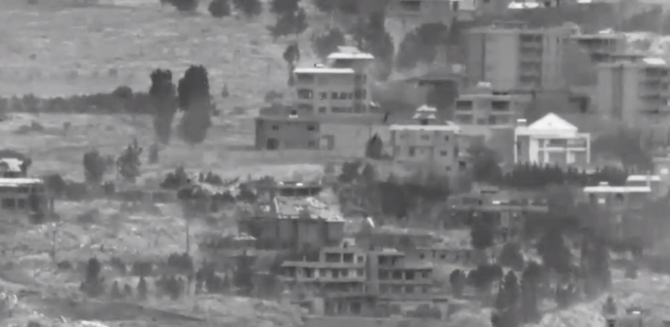
- GPS interference affecting both sides of Lebanese border, source says
BEIRUT: Two Hezbollah fighters were killed on Wednesday as Israel intensified strikes on south Lebanon following an attack by the Iran-backed group that wounded 14 Israeli soldiers.
Israel and Hezbollah have exchanged near-daily cross-border fire since Palestinian militant group Hamas attacked southern Israel on Oct. 7, triggering war in the Gaza Strip.
A security source said: “Hezbollah’s complex attack against the Israeli army in Wadi Al-Aramshe early on Wednesday, which led to the injury of 14 Israeli soldiers, including six with serious injuries, was absorbed by the Israeli side after the painful blow it directed at the party by assassinating three of its field officials.”
The Israeli army responded to the Wadi Al-Aramshe operation on Wednesday night by targeting the town of Iaat in the Bekaa Valley, 5 km from Baalbek. A drone strike hit a warehouse belonging to a member of the Al-Zein family, resulting in light wounds to one civilian.
Israel continues to jam GPS around the Lebanese southern border region, especially during military operations.
A security source said: “This interference negatively affects both the Israeli army and Hezbollah in targeting objectives.”
Hezbollah announced a series of operations since dawn on Thursday, targeting Israeli military sites opposite the Lebanese border.
The group targeted an Israeli force attempting to withdraw a military vehicle that was targeted on Wednesday at Metula, opposite the Lebanese town of Kfarkela.
At dawn, Israeli soldiers in Al-Malikiyah, opposite the Lebanese town of Aitaroun, were targeted by Hezbollah using missiles.
The group also targeted Israeli soldiers in Al-Marj.
“After careful monitoring and anticipation of the enemy’s movement at Al-Marj … they were targeted with missile weapons and suffered a direct hit; some died while others were injured,” the group said in a statement.
Hezbollah attacked Israeli soldiers using missiles in the Hanita forest, opposite the Lebanese town of Alma Al-Shaab.
On Thursday, the party mourned two members killed in Wednesday night’s shelling of Kfarkela. Mohammed Jamil Al-Shami from Kfarkela and Ali Ahmed Hamadeh from Doueir were killed in the Israeli operation.
The Israeli army targeted Lebanese towns with heavy shelling until dawn on Thursday. The town of Khiam was a priority target; correspondents in the area counted seven strikes and 128 artillery and phosphorous shells impacting between 8 p.m. and 4 a.m.
A young man from Habboush, Ahmed Hassan Al-Ahmed, was killed in the shelling and mourned by residents of his town.
Jets struck Hezbollah targets in Khiam, including infrastructure and two military buildings, the Israeli army said.
Israeli drones targeted a house on the outskirts of Markaba and in Blida on Thursday, with casualties reported.
The Israeli army also targeted Kfarkela with two missiles from a drone, and with artillery and phosphorous shells. From Metula opposite the border, Israeli soldiers combed the town with heavy machine guns.
The outskirts of Dhayra, Al-Bustan and Aita Al-Shaab were hit by gunfire from the Israeli position in Birkat Risha and other positions adjacent to the Blue Line.
German airline Lufthansa announced on Thursday it had extended the suspension of flights to Beirut and Tehran until April 30.
The decision was taken on the night of the Iranian attack on Israel last weekend.
UNIFIL spokesman Andrea Tenenti said that the organization’s peacekeepers “remain in their positions and carry out their duties, as well as our civilian staff.”
He added: “The safety and security of UN staff and their families are our priority.”
Dubai clears up after epic rains swamp glitzy desert city
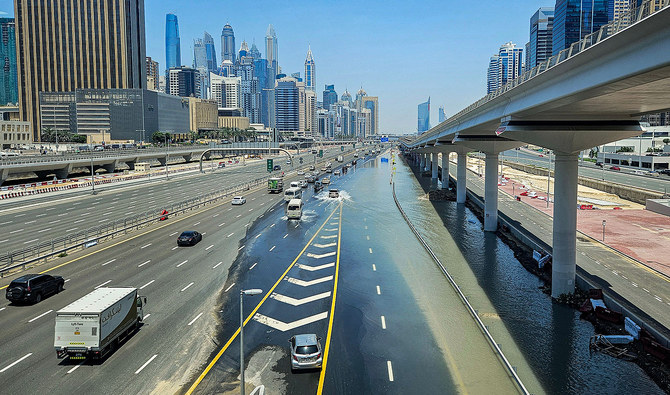
- Rains were the heaviest experienced by the United Arab Emirates in the 75 years that records have been kept
- Flooding trapped residents in traffic, offices and homes, houses’ roofs leaked and malls were overrun with water
DUBAI: Dubai, a city in the desert proud of its futuristic gloss, was on Thursday busy clearing its waterclogged roads and drying out flooded homes two days after a record storm saw a year’s rain fall in a day.
Dubai International Airport, a major travel hub, struggled to clear a backlog of flights and many roads were still flooded in the aftermath of Tuesday’s deluge.
The rains were the heaviest experienced by the United Arab Emirates in the 75 years that records have been kept. They brought much of the country to a standstill and caused significant damage.
Flooding trapped residents in traffic, offices and homes. Many reported leaks at their homes, while footage circulated on social media showed malls overrun with water pouring from roofs.
Traffic remained heavily disrupted. A highway through Dubai was reduced to a single lane in one direction, while the main road that connects Dubai with the capital Abu Dhabi was closed in the Abu Dhabi direction.
“This was like nothing else. It was like an alien invasion,” Jonathan Richards, a Dubai resident from Britain told Reuters.
“I woke up the other morning to people in kayaks with pet dogs, pet cats, suitcases all outside my house.”
Another resident, Rinku Makhecha, said the rain swamped her freshly renovated house she moved into two weeks ago.
“My entire living room is just like ... all my furniture is floating right now,” she said.
In Dubai’s streets, some vehicles, including buses, could be seen almost entirely submerged in water. Long queues formed at petrol stations.
Dubai airport had yet to resume normal operation after the storm flooded taxiways, forcing flight diversions, delays and cancelations.
Dubai Airports Chief Operating Officer Majed Al Joker told Al Arabiya TV he expected Dubai International Airport to reach 60-70 percent capacity by the end of Thursday and full operational capacity within 24 hours.
The airport struggled to get food to stranded passengers with nearby roads flooded and overcrowding limited access to those who had confirmed bookings.
RETURNING SUPPLIES
The storm, which hit neighboring Oman on Sunday, pounded the UAE on Tuesday, with 20 reported dead in Oman and one in the UAE.
While some roadways into hard-hit communities remain flooded, delivery services across Dubai, whose residents are used to ordering everything at the click of a mouse, slowly began returning to the streets.
Rains are rare in the UAE and elsewhere on the Arabian Peninsula, which is typically known for its dry desert climate. Summer air temperatures can soar above 50 degrees Celsius.
Following Tuesday’s events, questions were raised whether cloud seeding, a process that the UAE frequently conducts, could have caused the heavy rains.
But climate experts blame global warming for such extreme weather events.
Researchers anticipate that climate change will lead to heightened temperatures, increased humidity and a greater risk of flooding in parts of the Gulf region. Countries like the UAE where there is a lack of drainage infrastructure to cope with heavy rains can suffer the most.
A UAE government agency that oversees cloud seeding — a process of manipulating clouds to increase rainfall — denied conducting any such operations before the storm.
President Sheikh Mohammed bin Zayed Al Nahyan said in a statement he had ordered authorities to assess the damage and provide support to families impacted by the storm.
Dubai’s Crown Prince Sheikh Hamdan bin Rashid Al Maktoum said on X that the safety of citizens, residents and visitors was the utmost priority.
“At a meeting with government officials in Dubai, we set directives to prepare comprehensive plans in response to natural crises’ such as the unexpected current weather conditions,” he said.





